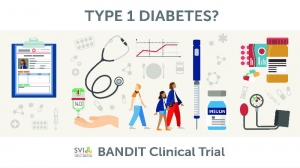Researchers at St Vincent’s Institute of Medical Research (SVI) in Melbourne are leading a clinical trial to test a treatment intended to stop the immune system from destroying the insulin-producing cells of people with newly diagnosed type 1 diabetes.
“When type 1 diabetes is first diagnosed there is a substantial number of insulin-producing cells still present. The BANDIT (baricitinib in new onset type 1 diabetes) Trial will help determine if the drug baricitinib, currently used to treat rheumatoid arthritis, will protect the insulin-producing cells from immune attack. This would allow people who have recently been diagnosed with the disease to continue to produce insulin for a longer period and improve their glucose control.”
“It is tremendously exciting for us to be the first group anywhere in the world to test the efficacy of baricitinib as a potential type 1 diabetes treatment.”“If the trial proves successful, production of insulin will be maintained and people with type 1 diabetes will be significantly less dependent on insulin treatment.”
“This is a fantastic opportunity for Australian research and an important step towards novel type 1 diabetes treatments. We’re proud to be supporting a clinical trial that builds on many years of work led by the team at SVI – a demonstration of translational research in action.”
Associate Professor John Wentworth, endocrinologist at The Royal Melbourne Hospital, Director of the Type 1 Diabetes TrialNet collaborative and co-investigator on the BANDIT Trial said:
“This is a great opportunity for Australian researchers and trial participants. We will, for the first time, determine if this tablet can be used to treat type 1 diabetes.”
Libby Rose was 12 when she received her type 1 diabetes diagnosis. The impact, physically and emotionally, was immediate. “I was overwhelmed; I didn’t understand what was going on. And because of the stress, my sugar levels kept rising, which caused me to become sick again.”
“I want my daughter and others to be able to live a carefree life, free of calculations, side effects, needles, pain, external pumps hidden inside pockets and the concern about long-term health issues. I really hope that this trial provides other families with an alternative treatment option for this disease.“It’s too late for us to be a part of the trial, but if we could, we would certainly be interested to help make the lives of people who might be diagnosed with type 1 diabetes in the future look more ‘normal’.”
During the first year, participants will be required to attend a trial site once a month and take either a baricitinib or a placebo tablet once a day. In the second year, participants will be required to visit their trial site on two occasions for follow up to check blood glucose and other levels.



